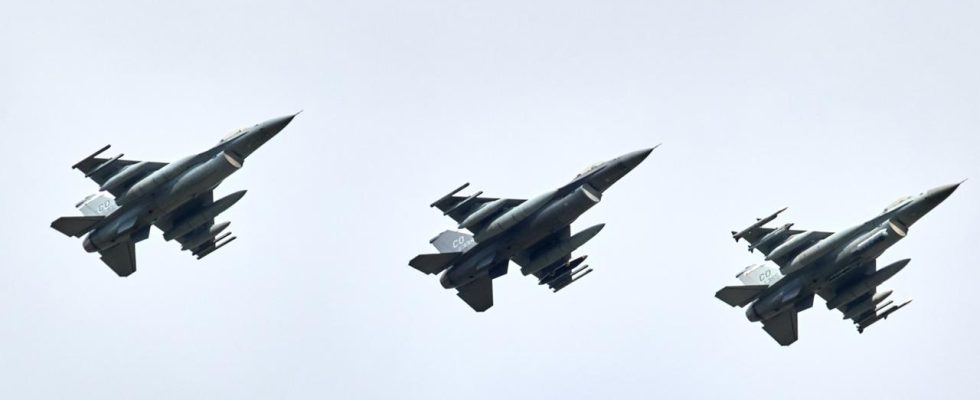More than 10,000 soldiers, 250 aircraft from 25 countries: In a few days, the largest air force maneuver in NATO history will begin. It will be clearly felt in Germany. How clear is debatable.
“No, here in town hardly anyone will be surprised.” Jörg Meier, the mayor of the 1,000-strong community of Jagel in Schleswig-Holstein, sounds over the phone with the ARD Capital Studio very relaxed. “And the few of us who don’t read the local press will hear about it by Monday at the latest – there will be somewhat larger flight operations.”
A little bigger is, to put it mildly, a gross understatement. From June 12, next-door Jagel Air Force Base will be a main hub for the largest air-deployment exercise in NATO’s history. 25 nations are taking part, and 250 aircraft and helicopters will be involved, including over 100 US National Guard aircraft.
“We are in the lead”
“This is an impressive demonstration of the alliance’s ability to defend itself,” said Air Force Inspector Ingo Gerhartz at the presentation of the exercise today. He emphasizes the special German responsibility: “We are in the leading role and that is exactly what the partners keep telling me: Go ahead, do something, especially with your position in Europe.”
Interest in this mammoth air exercise, and with it the number of participating nations, has grown significantly among NATO countries over the past year. Tent camps and container villages were built around German air force bases for soldiers not only from European partners.
The Inspector of the Air Force Gerhartz presenting the exercise.
Scenario seems more realistic today
In 2018, when the US Air Force and Air Force maneuvers were designed, Russian troops had not yet invaded eastern Ukraine. Since then, however, the exercise scenario has also seemed increasingly realistic to many European partners: A troop formation from an eastern military alliance has invaded Germany together with special forces and is now occupying eastern Germany, according to the Bundeswehr’s initial description. Energy supplies have been reduced, disinformation campaigns were running on German soil. Germany has declared the alliance case according to Article 5, now it is about air sovereignty over German soil.
The exercise is, as the name “Air Defender” shows, purely defensive, emphasize all participating nations. Even if the exercise scenario suggests otherwise, it is expressly not directed against Russia.
Amy Gutmann, the US ambassador to Germany, diplomatically indicates that the changed situation in Europe after Russia’s war of aggression against Ukraine was taken into account during the maneuvers: “There is only real security if you prevent wars and you can only hope to avoid war if one is adequately prepared. That’s a quote from a US general in 1951, but that important idea is even truer today than it was then.”
Large part of German airspace affected
The large-scale exercise will affect a large part of German airspace: in addition to Jagel and Hohn in Schleswig-Holstein, the military aircraft will take off from Wunstorf (Lower Saxony), Spangdahlem (Rhineland-Palatinate) and Lechfeld (Bavaria). Volkel in the Netherlands and Caslav in the Czech Republic are the other bases across the borders.
The practicing nations are trying to keep the burden on the population in Germany low during the two weeks from June 12th to 23rd, says the Bundeswehr, and presents a time concept: In the east exercise room, which includes the Baltic Sea, Mecklenburg-Western Pomerania and parts As far as Saxony is concerned, practice takes place between 10 a.m. and 2 p.m., in the southern exercise area (especially in Baden-Württemberg and Bavaria) between 1 p.m. and 5 p.m. and in the northern exercise area between 4 p.m. and 8 p.m., this is the airspace over the North Sea, Schleswig-Holstein and Lower Saxony. There are no practice flights at night or at weekends.
Therefore, nobody in the Federal Ministry of Defense in Berlin expects mass protests from citizens because of the disturbance of the peace or even demonstrations against the maneuvers like in the days of the Cold War. The noise from the tornadoes, Eurofighters, F-15s, F-16s, A10s and whatever else the alliance throws into the air should be the least of the problems. There is also less concern at the moment about the environmental pollution caused by millions of liters of kerosene or other fuels.
Union expects massive flight delays
But carrying out such an exercise, including aerial refueling and military interception exercises as well as low-level flight maneuvers, without affecting civil air traffic in the Federal Republic, at least the air traffic control union considers impossible. She speaks of “50,000 minutes of delays every day” that cause the maneuver.
“Germany is becoming the bottleneck in European aviation,” said the chairman, Matthias Maas ARD Capital Studio. “It is utopian to believe that you can practice over Central Europe and that regular air traffic will just continue as it is. But the Ministry of Defense tried to promise airlines and passengers exactly that at the beginning. No, such a maneuver simply involves too many imponderables than that you can say that.”
In principle, the organized air traffic controllers supported the air-laying exercise. But one would like a little more realism from those responsible, according to Maas.
The Ministry of Defense in Berlin refers to simulations by Eurocontrol, which had shown that “no flight cancellations” were to be expected during the maneuver, “at most delays”.
“You will feel that with us”
It will be possible to see whether the scenario will come true as early as next week, when the airspace over Mecklenburg-Western Pomerania and the Baltic Sea will be temporarily closed to civil aviation at all altitudes from Monday.
Many of those responsible in Berlin will wish for the attitude of Jagel Mayor Meier: “Nobody can claim that normal operations will be in the air from Monday. You will feel that here. But: On the one hand, the maneuver lasts only twelve days and on the other hand, I think it’s simply necessary in terms of global politics.”

